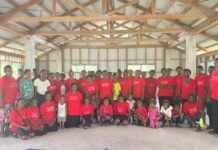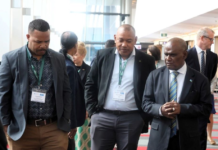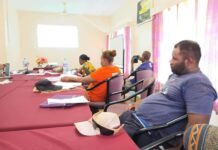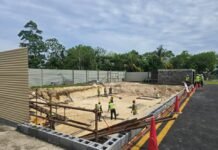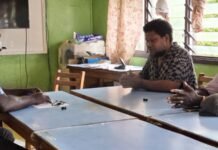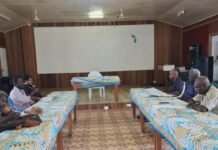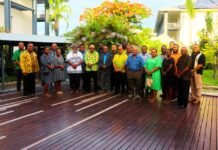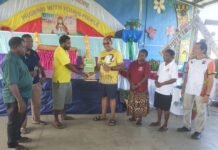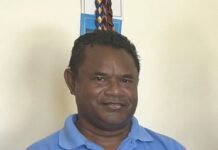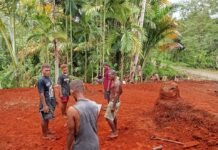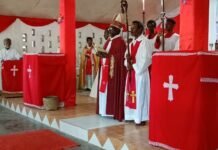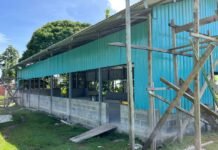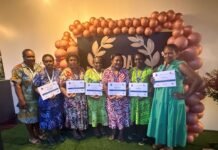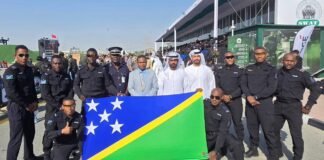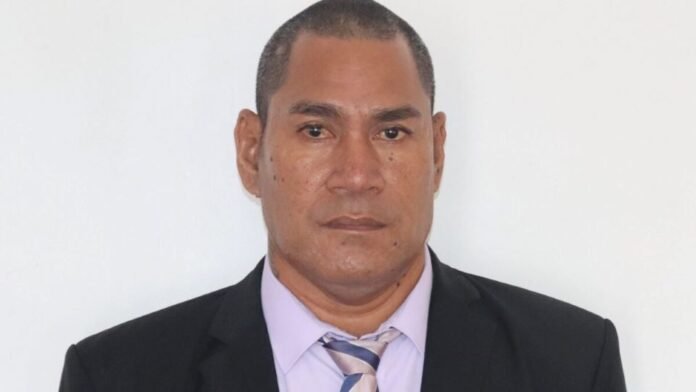
THE Minister for Lands, Housing and Survey, Hon. Polycarp Paea has outlined the Ministry’s key policy priority subjects as mandated by the Government’s 100-day programme.
These included the Customary Land Recording Program, the Greater Honiara Urban Development Strategy and Action Plan (GHUDSAP), and addressing illegal squatter Settlements around Honiara city.
Speaking in response to the Governor General’s Speech from the throne in Parliament, Minister Paea said these tasks are not easy but his Ministry is determined to achieve them in the next four years.
The Customary Land Recording program is the first program that aims to help tribal land-owning groups record their land and resources. This is important to minimize land disputes and to prepare land for development programs suitable for their land.
“This program is aimed at securing land ownership for traditional landholding groups while enabling them to utilize their land for investment and economic development,” Hon. Paea said.
This process enables landowning groups to record and apply for registration as “Customary Land Perpetual Estates,” which differ from standard estates since they are held in the group’s name and cannot be transferred.
The Customary Land Perpetual Estates cannot be sold outright and the law prevents individual control over the land, ensuring it remains with the group across generations while allowing for leasing, subdivision, and other uses to promote security and attract investment.
The Ministry of Lands is planning to roll out this program in collaboration with the Ministry of Provincial Government Institutional Strengthening, the Ministry of Traditional Governance, Peace and Ecclesiastical Affairs, and the Ministry of Rural Development to cover all 50 constituencies.
Once recorded, these customary land areas are then linked to each Provincial urban center through specialized economic development programs supported by a whole of government approach.
The second program is the Greater Honiara Urban Development Strategy and Action Plan (GHUDSAP) and the Greater Auki Urban Management Plan.
The Ministry of Lands is reviewing the Greater Honiara Urban Development Strategy and Action Plan framework designed to guide the urban development of Greater Honiara City. This framework presents a vision for sustainable urban growth, highlighting the necessity for mixed-use developments, increased population densities, and enhanced infrastructure to improve the quality of life for residents.
Furthermore, it tackles challenges such as limited access to investment capital for local businesses, the need for secure land access, and the significance of climate resilience.
“The strategy encompasses a long-term investment framework and a rolling five-year plan to prioritize projects that align with broader socio-economic growth and urban sustainability,” Hon. Paea said.
In addition, the Greater Auki urban management plan is a new initiative by the GNUT government. It replicates the Greater Honiara Urban Development Strategy. This project supports the Auki Local Planning Scheme which is confined to Auki legal boundary.
The Greater Auki Urban Management Plan seeks to address the problems that result from rapid urban growth in Auki Town and its surrounding regions, especially Auki, and extending northward toward the Fiu area Northwest of Auki Town.
Similarly, the Ministry of Lands is working on the Noro Local Planning Scheme and subsequently the Noro Munda Greater area in the Western Province. This scheme is important to chart the way forward for proper infrastructure development in Noro town and to provide opportunities to improve revenue collection according to classes of development.
The third program of the Ministry is addressing illegal squatting on private and public land in and around Honiara.
Minister Paea stressed that illegal squatting causes significant problems, such as a lack of access to essential services like electricity, water, and sanitation, leading to poor living conditions and health risks.
“Squatters experience legal uncertainty and eviction threats, causing anxiety and insecurity. It can also strain social and ethnic relations, especially in regions with land disputes, and may harm the environment in sensitive areas,” Hon. Paea said.
He added that economic opportunities are limited, maintaining poverty, and inadequate infrastructure raises disaster vulnerability. Moreover, weak law enforcement in these areas can increase crime rates and safety issues.
The Ministry has already created a task force that includes the Commissioner of Lands as the Chairman and members include representatives from HCC, Guadalcanal Province, and Senior Lands Officers.
Work on a framework to deal with illegal squatting is ongoing. This framework will manage squatter settlements and provide a structured approach that supports comprehensive planning and efficient interventions.
It enhances coordination among stakeholders, ensures consistency and scalability of solutions, incorporates sustainability for long-term viability, and improves risk management by identifying challenges early.
The Frameworks also emphasize community involvement for better decision-making and offer tools for monitoring and evaluating progress to facilitate continuous improvement.
The Ministry will finalize a new National Housing policy, aimed at encouraging citizens to own homes. To support this, the government will assist in the creation of land subdivisions, with plots available through a tender process, and collaborate with private sector developers to construct affordable housing units.
This joint initiative also involves creating a sustainable rental housing program tailored for public servants working in Honiara and other provincial centers. Part of the policy includes the review and implementation of the ‘Housing Assistance’ in collaboration with the Ministry of Public Service.









